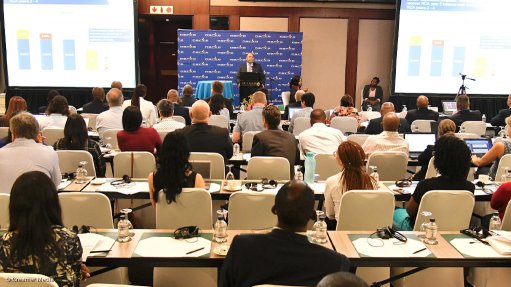
A photo of Eskom CFO Calib Cassim presenting its case at a previous tariff hearing
Photo by: Creamer Media's Donna Slater
The National Energy Regulator of South Africa (Nersa) has notified the Gauteng division of the High Court that it will oppose Eskom’s application to have the regulator’s decision to reject the utility’s fifth multiyear price determination (MYPD5) revenue application reviewed and set aside.
Eskom approached the court on October 15 after the regulator voted, on September 30, to reject Eskom’s MYPD5 submission for the three financial years from 2022/23 to 2024/25.
The application was submitted to Nersa on June 2 and, prior to the rejection, was expected to be adjudicated before year-end, for implementation on April 1.
Nersa’s rejection was based on the fact that the MYPD methodology had expired and should be changed ahead of the next tariff adjustment to reflect developments in the electricity supply industry, including the impending unbundling of Eskom.
Nersa said Eskom's MYPD5 application was based on the MYPD4 methodology, "whose applicable control period is ending on 31 March 2022".
“After due consideration of the rationality and legality of applying an expired MYPD4 methodology and whether this was in the public interest, the Energy Regulator rejected Eskom’s MYPD5 application," Nersa said in a statement.
Nersa then requested Eskom to submit a one-year interim application for the 2022/23 financial year, preferably based on the principles of the new methodology that was under consideration.
Ahead of the MYPD5 rejection, Nersa released a consultation paper on September 24 outlining the principles of a possible new methodology, which Nersa said should be premised on a “cost-to-serve approach” and based on the principles of activity-based costing, type-of-service costing, and marginal pricing to set tariffs
The paper stated that the current methodology had failed to provide price stability, with tariffs having surged by 175% over the past decade, in a context where consumer inflation had remained within a 3% to 7% band.
A closing date of October 22 was set for written comments on the methodology, and Nersa also hosted public consultation workshops in October on the matter.
In its submission, Eskom noted that a court process had been initiated to ensure that Nersa made a revenue decision that could be implemented on April 1, using the prevailing methodology.
The utility also appealed for “incremental” changes rather than a “big bang approach” and emphasised the need for transitional mechanisms.
Professor Anton Eberhard, of the Power Futures Lab at the University of Cape Town’s Graduate School of Business, argued in his submission on the paper that it would be “imprudent and destabilising” for Nersa to introduce a radically new regulatory methodology in the midst of an existing MYPD.
“Internationally, regulatory best practice is for consultative papers on regulatory reforms to be introduced a year or two or three before implementation,” Eberhard said, cautioning that Eskom would “almost certainly win its court case”.
In its review affidavit, meanwhile, Eskom described the rejection of its MYPD5 submission as “patently irrational and unlawful” and requested that it be set aside.
Eskom is also asking the court to grant it urgent interim relief in the form of an order directing Nersa to process the 2022/23 revenue application under the existing tariff methodology so that a “lawful tariff” can be determined for its upcoming financial year, which begins on April 1.
Such relief is necessary, Eskom argues, to provide a lawful route to determining an Eskom tariff for the 2022/23 financial year in the limited time remaining before March 15, when that tariff has to be tabled in Parliament in accordance with the requirements of the Municipal Finance Management Act.